Boost Your Health: Combatting Vitamin K Deficiency

What is Vitamin K?
Vitamin K Deficiency is an essential fat-soluble nutrient that plays a crucial role in various bodily functions, primarily in blood clotting and bone health. It exists in two main forms:
- Vitamin K1 (Phylloquinone): Found primarily in leafy green vegetables, this form plays a significant role in blood coagulation.
- Vitamin K2 (Menaquinone): Found in fermented foods and animal products, this type is essential for bone metabolism and cardiovascular health.
Many may not realize the extent of vitamin K’s influence on overall health. As someone who struggled with frequent bruising in their early twenties, learning about vitamin K’s role was enlightening. Regularly incorporating more leafy greens, like kale and spinach, eventually led to fewer unexplained bruises, underscoring how a balanced diet can affect the body in tangible ways.
Causes and Symptoms of Vitamin K Deficiency
Vitamin K deficiency can arise from several factors, often resulting from inadequate intake or absorption issues. Key causes include:
- Poor dietary intake: Individuals who consume few green vegetables or high-fat foods may lack sufficient vitamin K.
- Malabsorption conditions: Disorders such as celiac disease, Crohn’s disease, or chronic pancreatitis can hinder the absorption of vitamin K from foods.
- Long-term antibiotic use: Antibiotics can disrupt the gut microbiota, which is responsible for producing some vitamin K.
The symptoms of vitamin K deficiency often manifest gradually and can vary from person to person. Common symptoms include:
- Unusual bleeding or bruising
- Prolonged bleeding from cuts
- Blood in urine or stool
- Weakness and fatigue
Recognizing these symptoms is crucial, especially for those at risk. The experience of a friend who was shocked to find out she had a deficiency after an unexplained nosebleed serves as a reminder that vigilance is vital. By understanding and identifying the signs early, individuals can seek the right dietary changes and medical advice to address the issue proactively.
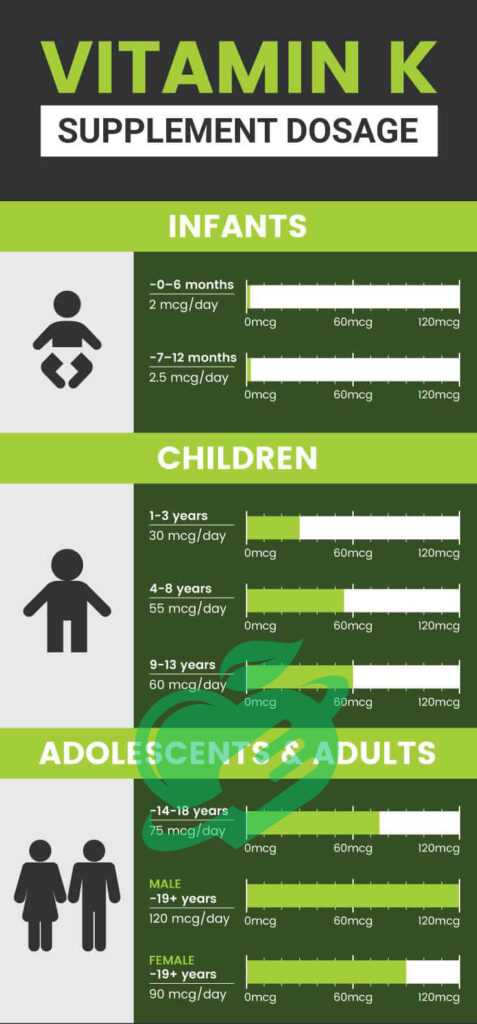
Role of Vitamin K in the Body
Vitamin K is often overlooked, yet it is vital for several functions that keep our bodies running smoothly. Most notably, it plays a significant role in:
- Blood Clotting: Vitamin K is essential for synthesizing proteins required for blood coagulation. Without it, even minor cuts can result in excessive bleeding, as the body struggles to form clots.
- Bone Health: This nutrient is crucial for the regulation of calcium in bones and blood. Vitamin K helps to bind calcium to the bone matrix, thereby reducing the risk of fractures.
- Heart Health: Emerging research suggests that vitamin K may help prevent arterial calcification, which is beneficial for maintaining cardiovascular health. A diet rich in vitamin K can contribute to better heart health over time.
Read also: Redefining Sweetness: The Transformative Health Benefits of Molasses.
Having a loved one who fractured their wrist during a minor fall made this all the more real. After doctors found low vitamin K levels in their blood, they realized how essential this vitamin is for maintaining strong bones.
Impact of Deficiency on Overall Health
The impact of vitamin K deficiency extends far beyond increased bleeding. It can lead to serious health complications, including:
- Increased Risk of Osteoporosis: Insufficient vitamin K can compromise bone density, making bones weaker and more susceptible to fractures, particularly in older adults.
- Cardiovascular Issues: A deficiency may contribute to arterial calcification, increasing the risk of heart disease. Healthy arteries require sufficient vitamin K to function properly.
- Potential Cognitive Impacts: Some studies have begun to explore the link between vitamin K levels and cognitive functions, suggesting that low levels could influence memory and brain health.
These potential impacts highlight why it’s essential to maintain optimal vitamin K levels. Taking proactive steps in one’s diet can forge a path to better overall health. A personal experience of modifying one’s meals—including more green vegetables—prompted a realization: sustaining adequate vitamin K is not just beneficial; it’s essential for long-term well-being. Whether it’s for blood consistency or bone strength, prioritizing this vital nutrient in everyday life pays off in surprising ways.
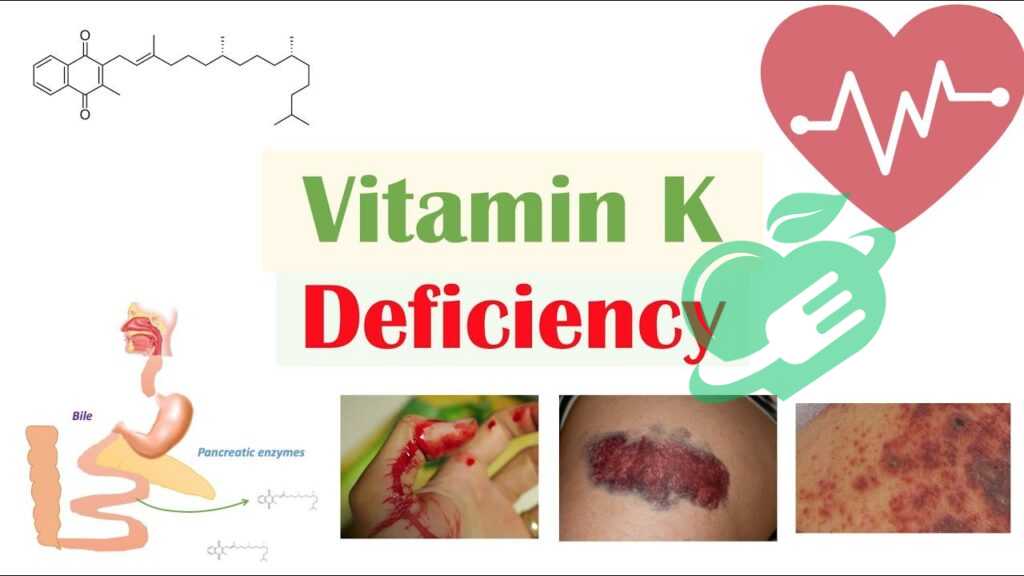
Identifying Vitamin K Deficiency
Identifying vitamin K deficiency is crucial, especially since its symptoms can be subtle and easily mistaken for other health issues. If someone suspects they may have a deficiency—perhaps due to symptoms like unusual bruising or prolonged bleeding—the first step usually involves a visit to a healthcare provider. Healthcare professionals may recommend a few tests to determine vitamin K levels:
- Prothrombin Time (PT): This blood test measures how long it takes blood to clot. An extended PT can indicate a deficiency in vitamin K since the vitamin is essential for producing clotting factors.
- Vitamin K Level Test: A specific blood test can directly measure the level of vitamin K in the bloodstream, but it’s less commonly performed due to its complexity.
Having a friend diagnosed with low vitamin K after undergoing tests for unexplained fatigue underscored the importance of being proactive about health. The path from being uncertain about health issues to discovering a deficiency can make all the difference.
Who is at Risk?
Understanding who is at higher risk of vitamin K deficiency can be beneficial for early identification and prevention. Several groups may be particularly vulnerable:
- Individuals with Malabsorption Disorders: Those with conditions like celiac disease, Crohn’s disease, or pancreatic insufficiency may struggle to absorb vitamins properly, including vitamin K.
- People on Long-term Antibiotics: Antibiotic use can disrupt the balance of gut bacteria responsible for producing vitamin K, leading to lower levels over time.
- People older than 70: Aging can impact nutrient absorption, and older adults may consume fewer green vegetables, putting them at risk.
- Newborns: Infants can be at risk due to low vitamin K stores at birth. Hence, a vitamin K shot is often given to newborns shortly after delivery.
Recognizing these risk factors can empower individuals to seek out dietary sources of vitamin K or consult their healthcare providers for supplements. Taking action proactively ensures that vitamin K levels remain adequate for optimal health.
Read also: Green Juice: A Healthy Drink for Detox and Energy.
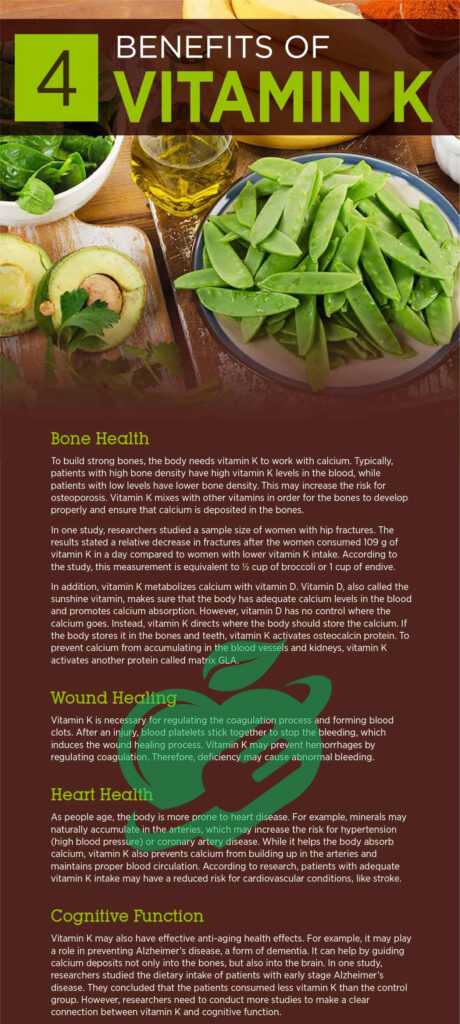
Treating and Preventing Vitamin K Deficiency
Avoiding vitamin K deficiency often starts in the kitchen. Incorporating foods rich in this essential nutrient can dramatically improve one’s health. Here are some excellent dietary sources of vitamin K to consider:
- Leafy Greens: Kale, spinach, collard greens, and Swiss chard are among the richest sources of vitamin K1. A colorful salad packed with these greens can be both delicious and nutritious.
- Cruciferous Vegetables: Broccoli, Brussels sprouts, and cabbage also contribute significant amounts of vitamin K.
- Fermented Foods: Foods like sauerkraut and natto (fermented soybeans) are great sources of vitamin K2, which supports bone health.
- Animal Products: Eggs and dairy products, such as cheese, contain vitamin K2 and can enrich one’s diet if included mindfully.
When a colleague mentioned that simply adding a kale smoothie to her daily breakfast routine significantly improved her energy levels, it became clear how impactful dietary changes can be. Eating a diverse range of these foods can help maintain adequate vitamin K levels.
Supplements and Treatment Options
For those who might struggle to get enough vitamin K through their diet—whether due to lifestyle, medical conditions, or dietary restrictions—supplements can be a viable option. Here’s what to consider:
- Vitamin K Supplements: These come in various forms, including vitamin K1 and K2. While K1 is primarily used for blood clotting, K2 may be more beneficial for bone health. It’s essential to consult with a healthcare provider before starting any supplementation.
- Injections: In cases of severe deficiency, a healthcare provider may recommend vitamin K injections, especially for individuals unable to absorb the vitamin effectively through food.
- Combining Sources: For optimal results, combining a nutrient-rich diet with supplements can ensure adequate vitamin K levels.
My own experience of trying out supplements after a blood test revealed low vitamin K was eye-opening. It underscored the importance of adapting dietary habits and seeking medical guidance when necessary. Proactively addressing vitamin K intake through both dietary adjustments and appropriate supplements can help ensure the body remains healthy and vibrant over time.
Read also: Weight Lifting Women: Lift Heavy, Look Amazing.

Incorporating vitamin K-rich Foods into the Diet
Boosting vitamin K levels can be an enjoyable journey, especially when exploring delicious options. Adding vitamin K-rich foods to your meals doesn’t have to be complicated! Here are some practical ideas to help you incorporate these nutritional powerhouses into your diet:
- Start with Smoothies: Blend up some kale or spinach with your favorite fruits. Tossing in a banana or berries can disguise the taste of greens while loading your smoothie with vitamin K.
- Creative Salads: Make salads the star of your meals. Mix arugula, spinach, and shredded Brussels sprouts with a protein source like grilled chicken or chickpeas for an energizing dish.
- Stir-fries and Sautéed Vegetables: Cook up some broccoli, collard greens, or bok choy in a bit of olive oil or sesame oil. Not only do these add flavor, but they also enhance nutrient absorption due to the healthy fats.
- Snacks with Vegetables: Pair raw veggies like carrots and bell peppers with leafy green dips, such as hummus mixed with spinach or kale, creating a quick and nutritious snack.
Hearing a friend rave about their newfound love for salads packed with different dark greens inspired me to explore diverse recipes, making it easier to enjoy the nutrient boost without feeling like it’s a chore.
Healthy Habits to Improve Vitamin K Absorption
Eating vitamin K-rich foods is only part of the equation; how we consume them can significantly impact their absorption. Here are some healthy habits to consider:
- Pair with Healthy Fats: Vitamin K is fat-soluble, so including healthy fats (like avocados, olive oil, or nuts) in your meals can enhance absorption.
- Stay Hydrated: Drinking enough water aids digestion and nutrient transport throughout the body. Aim for adequate water intake throughout the day.
- Mindful Eating: Focus on a wholesome and balanced approach to meals. Being mindful can enhance your relationship with food and help prioritize nutrient-rich options.
My personal experience proves that these small adjustments can create a substantial difference in nutrient absorption. After incorporating healthy fats into my meals, I felt a noticeable increase in energy and overall health. Embracing these lifestyle changes can effortlessly support optimal vitamin K levels and yield lasting health benefits!
Read also: Discover the Benefits of Vitamin A for Shiny, Healthy Hair
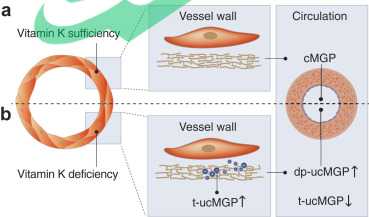
Tracking Progress and Monitoring Vitamin K Levels
Monitoring vitamin K levels is crucial, especially if one has previously struggled with deficiency or has risk factors. Regular check-ups and blood tests can provide valuable insights into one’s nutritional status and overall health. Here’s how these evaluations can be beneficial:
- Proactive Health Management: Scheduling routine visits with a healthcare professional can help keep your health in check. Regular blood tests, particularly the Prothrombin Time (PT) test, can assess your vitamin K levels, giving you a clearer picture of your body’s needs.
- Tailored Recommendations: Based on blood test results, healthcare providers can recommend personalized dietary adjustments or adjustments in supplementation if necessary. For instance, my own experience highlighted how a simple blood test led to dietary changes that increased my energy levels significantly.
- Building Awareness: Engaging in regular health evaluations enhances awareness about personal health. This knowledge empowers individuals to make informed decisions about their dietary choices and supplements.
Adjusting Diet and Supplement Intake
After receiving feedback from check-ups, adjusting one’s diet and supplement intake can enhance vitamin K levels effectively. Here are some strategies to consider:
- Evaluate Dietary Sources: Reflect on your current intake of vitamin K-rich foods. If you’re falling short, consider increasing your consumption of leafy greens and fermented foods as part of your meals.
- Monitor Supplement Dosage: If you’re using vitamin K supplements, remember that more isn’t always better. Regular blood tests can help determine whether you need to adjust your dosage—either increasing or decreasing it based on your levels.
- Stay Flexible: Be open to modifying your diet based on your body’s feedback. If some foods don’t sit well or you find new favorites, embrace the change! For example, when I realized I was more energized after switching to a kale salad over spinach, I adjusted my meals accordingly.
By committing to regular check-ups and proactively adjusting dietary choices, individuals can significantly optimize their vitamin K levels, leading to enhanced health and well-being. Tracking progress is not just about numbers; it’s about embracing a healthier lifestyle that works in harmony with your body.
Read also: Enhancing Your Health with Carnitine Deficiency Supplements.

Risks and Complications of Severe Vitamin K Deficiency
Severe vitamin K deficiency can pose significant risks to an individual’s health. It’s essential to recognize the potential complications that can arise if deficiency is left unaddressed. Here are some critical health consequences:
- Bleeding Disorders: One of the most alarming results of severe vitamin K deficiency is the increased risk of bleeding. Without adequate vitamin K, the body struggles to produce the clotting factors necessary for stopping bleeding, leading to symptoms like:
- Easy bruising
- Nosebleeds
- Bleeding gums
- Blood in urine or stool
- Bone Weakness: Lack of vitamin K impairs the body’s ability to bind calcium in bones, leading to potential bone loss and increasing the risk of fractures. This can be particularly concerning for older adults or those with osteoporosis.
- Heart Issues: Emerging research indicates that inadequate vitamin K levels may contribute to arterial calcification, heightening the risk of heart disease. This connection highlights the importance of maintaining balanced vitamin K levels for cardiovascular health.
A family member experienced serious bruising after a minor fall due to undiagnosed vitamin K deficiency. This ordeal served as a stark reminder of how crucial it is to pay attention to our body’s signals.
Seeking Medical Advice and Intervention
If you suspect a vitamin K deficiency, it’s vital to seek medical advice. Acting quickly can help prevent potential complications and improve overall health. Here’s what to consider:
- Consulting Your Doctor: Schedule an appointment with your healthcare provider to discuss your symptoms and dietary habits. A thorough evaluation can lead to appropriate testing and identification of any deficiencies.
- Follow-up Treatments: If diagnosed with a deficiency, your doctor may recommend dietary changes, supplements, or even vitamin K injections, depending on severity. Adhering to these recommendations is crucial for recovery.
- Monitoring Progress: After initiating treatment, regular follow-up visits and blood tests are essential to track progress and make necessary adjustments.
Embracing medical advice and timely intervention can dramatically enhance one’s health journey. Understanding the risks associated with severe vitamin K deficiency reinforces the importance of awareness and proactive measures. By prioritizing health and nutrition, individuals can mitigate risks and pave the way for better overall well-being.
Read also: How does diabetes affect your mood?
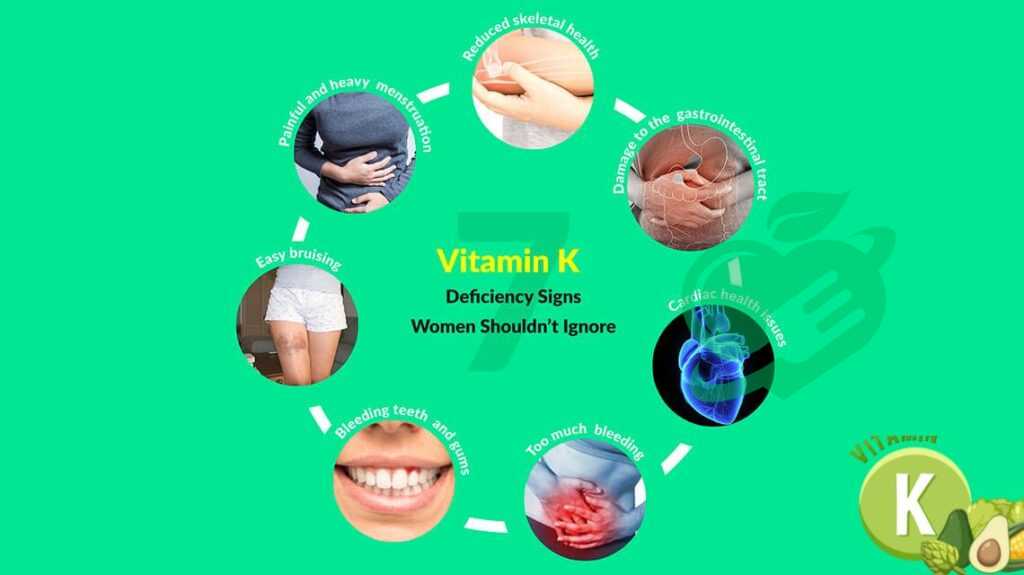
Importance of Maintaining Optimal Vitamin K Levels
In navigating through the complexities of health, the significance of maintaining optimal vitamin K levels cannot be overstated. This vital nutrient plays a critical role in several key bodily functions, ranging from effective blood clotting to promoting healthy bones and supporting cardiovascular health. When it comes to keeping the body in balance, awareness is key. As someone who discovered the impact of vitamin K on energy levels and overall well-being through dietary adjustments, the journey highlights how easily this often-overlooked nutrient can be integrated into daily life. Here’s a quick recap of why sustaining adequate vitamin K levels is essential:
- Prevention of Bleeding Disorders: Adequate vitamin K helps prevent excessive bleeding, making blood clotting efficient and reducing the risk of unexpected bruising or injuries.
- Bone Health: It aids in the proper utilization of calcium, essential for maintaining bone strength and preventing osteoporosis.
- Cardiovascular Well-Being: Proper levels may support heart health by preventing arterial calcification and promoting better circulation.
Final Thoughts on Improving Health through Vitamin K Integration
Improving health through vitamin K integration can feel both empowering and accessible. Simple lifestyle changes like embracing a diet rich in leafy greens, fermented foods, and healthy fats significantly contribute to boosting vitamin K levels.
- Mindful Eating: Focusing on nutrient-dense meals can connect us to our health goals while fostering a better relationship with food.
- Regular Monitoring: Committing to regular health check-ups ensures one stays aware of nutritional status and can adjust dietary habits or supplements as necessary.
Frequently Asked Questions
Which drugs cause vitamin K deficiency?
Antibiotics (such as cephalosporins), cholestyramine, warfarin, salicylates, anticonvulsants, and specific sulfa medications are typical contributors to vitamin K deficiency. Other causes include large blood transfusions, disseminated intravascular coagulation (DIC), severe conditions, and chronic kidney disease or hemodialysis. 1
Is banana high in vitamin K?
2. Banana. This tasty fruit is rich in vitamin K, making it one of the best sources of this nutrient. Additionally, it contains other vital nutrients that support digestion and assist in managing weight. 2
Why take vitamin K with vitamin D?
Vitamin D enhances the synthesis of proteins that depend on vitamin K, which is necessary for their proper carboxylation and function. This review aims to outline the existing evidence regarding the collaborative relationship between vitamins D and K in relation to bone and cardiovascular health. 3
Why is vitamin K given in liver disease?
The coagulopathic changes occur due to the reduced synthetic function of the liver affected by cirrhosis. To address prolonged prothrombin times (PT) in cirrhotic patients, vitamin K is frequently administered. However, the guidelines for this practice are not established, and its effectiveness remains uncertain. 4
What does vitamin K do for the brain?
The findings indicated that elevated levels of vitamin K in the brain were linked to a 17% to 20% reduced likelihood of developing dementia or mild cognitive impairment (MCI), as well as a 14% to 16% decreased probability of reaching advanced Braak stages. This scale assesses the progression of Alzheimer’s and Parkinson’s diseases based on specific types and characteristics. 5
In my experience, learning about vitamin K and its benefits transformed how I approached my meals and health overall. Awareness and small yet meaningful changes made a lasting impact. By prioritizing optimal vitamin K levels through dietary choices and lifestyle modifications, individuals can protect themselves against deficiencies and cultivate a healthier future. Embrace the journey towards well-being, and let the integration of this essential vitamin be a guiding light on the path to lasting health!
Follow us for more updates and breaking news, as we provide you with everything new.




Can you be more specific about the content of your article? After reading it, I still have some doubts. Hope you can help me.
Of course, what is your question?